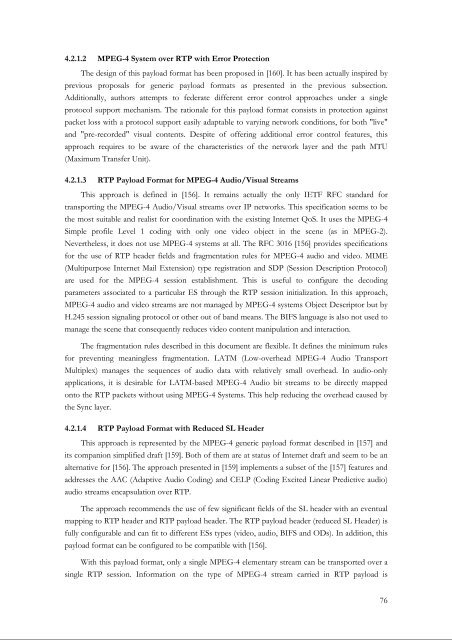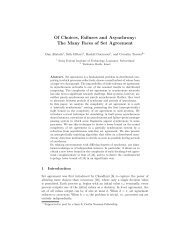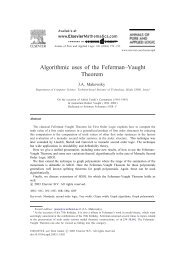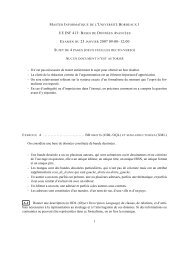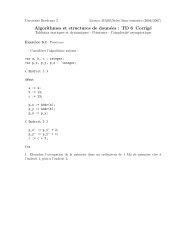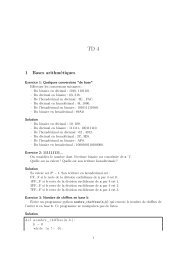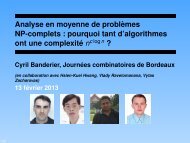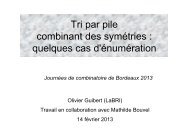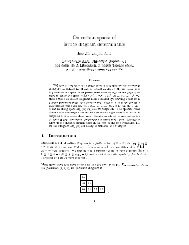TITRE Adaptive Packet Video Streaming Over IP Networks - LaBRI
TITRE Adaptive Packet Video Streaming Over IP Networks - LaBRI
TITRE Adaptive Packet Video Streaming Over IP Networks - LaBRI
You also want an ePaper? Increase the reach of your titles
YUMPU automatically turns print PDFs into web optimized ePapers that Google loves.
4.2.1.2 MPEG-4 System over RTP with Error Protection<br />
The design of this payload format has been proposed in [160]. It has been actually inspired by<br />
previous proposals for generic payload formats as presented in the previous subsection.<br />
Additionally, authors attempts to federate different error control approaches under a single<br />
protocol support mechanism. The rationale for this payload format consists in protection against<br />
packet loss with a protocol support easily adaptable to varying network conditions, for both "live"<br />
and "pre-recorded" visual contents. Despite of offering additional error control features, this<br />
approach requires to be aware of the characteristics of the network layer and the path MTU<br />
(Maximum Transfer Unit).<br />
4.2.1.3 RTP Payload Format for MPEG-4 Audio/Visual Streams<br />
This approach is defined in [156]. It remains actually the only IETF RFC standard for<br />
transporting the MPEG-4 Audio/Visual streams over <strong>IP</strong> networks. This specification seems to be<br />
the most suitable and realist for coordination with the existing Internet QoS. It uses the MPEG-4<br />
Simple profile Level 1 coding with only one video object in the scene (as in MPEG-2).<br />
Nevertheless, it does not use MPEG-4 systems at all. The RFC 3016 [156] provides specifications<br />
for the use of RTP header fields and fragmentation rules for MPEG-4 audio and video. MIME<br />
(Multipurpose Internet Mail Extension) type registration and SDP (Session Description Protocol)<br />
are used for the MPEG-4 session establishment. This is useful to configure the decoding<br />
parameters associated to a particular ES through the RTP session initialization. In this approach,<br />
MPEG-4 audio and video streams are not managed by MPEG-4 systems Object Descriptor but by<br />
H.245 session signaling protocol or other out of band means. The BIFS language is also not used to<br />
manage the scene that consequently reduces video content manipulation and interaction.<br />
The fragmentation rules described in this document are flexible. It defines the minimum rules<br />
for preventing meaningless fragmentation. LATM (Low-overhead MPEG-4 Audio Transport<br />
Multiplex) manages the sequences of audio data with relatively small overhead. In audio-only<br />
applications, it is desirable for LATM-based MPEG-4 Audio bit streams to be directly mapped<br />
onto the RTP packets without using MPEG-4 Systems. This help reducing the overhead caused by<br />
the Sync layer.<br />
4.2.1.4 RTP Payload Format with Reduced SL Header<br />
This approach is represented by the MPEG-4 generic payload format described in [157] and<br />
its companion simplified draft [159]. Both of them are at status of Internet draft and seem to be an<br />
alternative for [156]. The approach presented in [159] implements a subset of the [157] features and<br />
addresses the AAC (<strong>Adaptive</strong> Audio Coding) and CELP (Coding Excited Linear Predictive audio)<br />
audio streams encapsulation over RTP.<br />
The approach recommends the use of few significant fields of the SL header with an eventual<br />
mapping to RTP header and RTP payload header. The RTP payload header (reduced SL Header) is<br />
fully configurable and can fit to different ESs types (video, audio, BIFS and ODs). In addition, this<br />
payload format can be configured to be compatible with [156].<br />
With this payload format, only a single MPEG-4 elementary stream can be transported over a<br />
single RTP session. Information on the type of MPEG-4 stream carried in RTP payload is<br />
76


